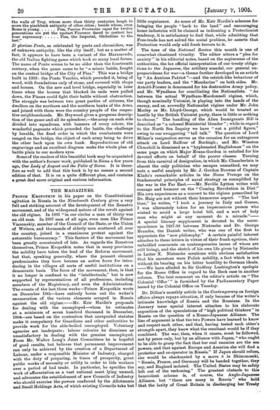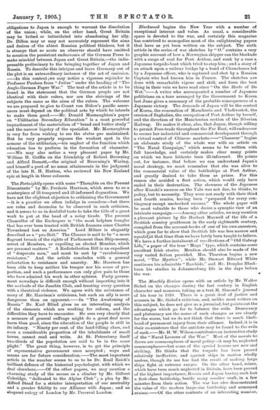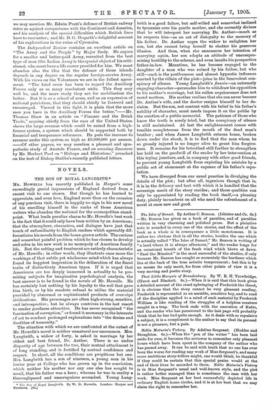PaiNcia KROPOTKIN in his paper on the Constitutional agitation in
Russia in the Nineteenth Century gives a very full and striking account of the development of the Zeinstvo movement, and of the widespread nature of the revolt against the old regime. In 1881 "in our circles a man of thirty was an old man. In 1897 men of all ages, even men like Prince Yiazemskiy, member of the Council of the State, or the Union of Writers, and thousands of elderly men scattered all over the country, joined in a unanimous protest against the autocratic bureaucracy." This feature of the movement has been greatly accentuated of late. As regards the Zemstvos themselves, Prince Kropotkin notes that in many provinces the nobility have taken the lead of the Reform movement. but that, speaking generally, where the peasant element predominates they have become an active force for intro- ducing in the villages all sorts of useful institutions on a democratic basis. The force of the movement, then, is that it no longer is confined to the "intellectuals," but is now supported by representatives of all professions, including members of the Magistracy, and even the Administration. The events of the last three weeks—Prince Kropotkin wrote on December 18th—have entirely borne out the writer's enumeration of the various elements arrayed in Russia against the old regime.—Mr. Keir Hardie's proposals for dealing with the unemployed—whom he estimates at a minimum of seven hundred thousand in December, 1904—are based on the contention that unmpealed statutes make it compulsory for Guardians and other authorities to provide work for the able-bodied unemployed. Voluntary agencies are inadequate ; labour colonies he dismisses as unsatisfactory in dealing with the genuine unemployed. From Mr. Walter Long's Joint Committees be is hopeful of good results, but believes that permanent improvement can only be achieved by the creation of a Department of Labour, under a responsible Minister of Industry, charged with the duty of preparing, in times of prosperity, great public works of necessity or utility in order to tide workers over a period of bad trade. In particular, he specifies the work of afforestation as a vast national asset lying unused, and advocates the establishment of new Councils of Industry who should exercise the powers conferred by the Allotments and Small Holdings Acts, of which existing Councils take but
home industries will be claimed as indicating a Protectionist tendency, it is satisfactory to find that, while admitting that Free-trade has not solved the social problem, he asserts that Protection would only add fresh terrors to it.
The tone of the National Review this month is one of somewhat chastened vivacity. The editor utters a "plea for anxiety" in his editorial notes, based on the supineness of the authorities, the lax official interpretation of our treaty obliga- tions to the Japanese, the artillery scandal, our general un- preparedness for war—a theme further developed in an article by "An Anxious Patriot "—and the ostrich-like behaviour of our party leaders, and the "Mandarins" on both sides. Mr. Arnold-Forster is denounced for his destructive Army policy, and Mr. Wyndham for conciliating the Nationalists. "As between the actual Wyndham-Macdonnell regime, which, though nominally Unionist, is playing into the hands of the enemy, and an avowedly Nationalist regime under Mr. John Morley or Mr. Lloyd-George, which would be treated as hostile by the British Unionist party, there is little or nothing to choose." The handling of the Alien Immigrants Bill is described as "a colossal Ministerial blunder " ; while in regard to the North Sea Inquiry we have "cut a pitiful figure," owing to our swaggering "tall talk." The question of Lord Milner's resignation serves as the occasion for an outrageous attack on Lord Balfour of Burleigh ; and Mr. Winston Churchill is dismissed as a "hyphenated Englishman" on the same page on which Major Evans-Gordon is extolled for his devoted efforts on behalf of the poorer classes. Turning from this carnival of denigration, in which Mr. Chamberlain is almost the only politician who escapes unscathed, we may note a useful analysis by Mr. J. Gordon Browne of Captain Klado's remarkable articles in the Novoe Vrentya on the fundamental principles of naval strategy as exemplified by the war in the Far East.—Mr. Neville Lytton writes with courage and humour on the "Coming Revolution in Diet." His own experiences as a convert to the regime prescribed by Dr. Haig are not without their humorous aspect. "The last time," he writes, "I took a journey in Italy and Greece, I was alternately taken for an impecunious person who wished to avoid a large hotel bill, and a sort of holy wan who might at any moment do a miraele."— A special literary supplement is devoted to the corre- spondence in 1887-88 between Nietzsche and Dr. George Brandes, the Danish writer, who was one of the first to appreciate the "new philosophy." A certain painful interest attaches to these letters in virtue of their frank egotism, their unbridled comments on contemporaries (some of whom are still living), and the sketch of his own life given by Nietzsche in Letter X. Nietzsche mentions with obvious satisfaction that his ancestors were Polish nobility, a fact which is not without its bearing on his bitter hostility to German ideals.
We have alluded to Sir Godfrey Lushington's apologia for the Home Office in regard to the Beck case in another column. The best comment on the editor's article on "The Colonial ' Offer ' " is furnished by the Parliamentary Paper issued by the Colonial Office on Tuesday.
Dr. Dillon's monthly article in the Contemporary on foreign affairs always repays attention, if only because of the writer's intimate knowledge of Russia and the Russians. In the January issue special interest attaches to his elaborate exposition of the speculations of "high political thinkers" in Russia on the question of a Russo-Japanese Alliance. The line of argument is that the two Powers have learned to know and respect each other, and that, having tested each other's strength apart, they know what the resultant would be if they combined. The war, then, when it ceases, must be followed, not by peace only, but by an alliance with Japan, "who ought to be able to grasp the fact that her real enemies are the sea powers, and that against Europe and America she will find protector and co-operator in Russia." If Japan should refuse, she would be checkmated by a move a /a Shimonoseki. "Russia, France, and Germany will be banded together, they say, and England isolated. The United States may be safely left out of the reckoning." The greatest obstacle to this benevolent scheme is, of course, the Anglo-Japanese Alliance, but "there are many in Russia" who hold that the laxity of Great Britain in discharging her Treaty obligations to Japan is enough to warrant the dissolution of the union; while, on the other hand, Great Britain may be bribed or intimidated into abandoning her ally. Dr. Dillon may or may not accurately represent the aims and desires of the ablest Russian political thinkers, but it is strange that so acute an observer should have omitted to mention the persistent endeavours of the German Press to make mischief between Japan and Great Britain,—the indis- pensable preliminary to the bringing together of Japan and Russia. To describe this intrigue and leave Germany out of the plot is an extraordinary instance of the art of omission. —In this context we may notice a vigorous rejoinder to Professor Paulsen from " Julius " under the heading of "The Anglo-German Paper War." The text of the article is to be found in the statement that the German people are not identical with their rulers, nor are the strivings of the subjects the same as the aims of the rulers. The welcome we are prepared to give to Count von Billow's pacific assur- ances must depend on the political acts by which he intends to make them good.—Mr. Donald Macnaughton's paper on "Utilitarian Secondary Education" is a most powerful impeachment of the materialism of "bread and butter study" and the narrow bigotry of the specialist. Mr. Macnaughton is very far from wishing to see the status quo maintained. But he very properly exposes the weakest spot in the armour of the utilitarian,—his neglect of the function which education has to perform in the formation of character. —We may also notice a very pleasant paper by Mr. William H. Griffin on the friendship of Robert Browning and Alfred Domett,—the original of Browning's Waring, and himself a poet of no mean attainments in the judgment of the late R. H. Hutton, who reviewed his New Zealand epic at length in these columns.
The Fortnightly opens with some "Thoughts on the Present Discontents" by Mr. Frederic Harrison, which seem to us a masterpiece of ill-tempered and ill-informed dogmatism. We have not the slightest objection to criticising the Government —it is a practice we often indulge in ourselves—but there are rules and decencies to be observed in such criticism, and it seems to us in doubtful taste to take the title of a great work to put at the head of a noisy tirade. The present Chancellor of the Exchequer is "the most helpless bungler that has ever been trusted with British finances since Charles Townshend lost us America." Lord Milner is elegantly described as a " pro-Beit." The Closure is said to be "a more flagrant breach of the rights of Parliament than Ship-money, arrest of Members, or expelling an elected Member, which are personal matters." A Redistribution Bill is an expedient of "desperate men," and must be met by "revolutionary resistance." And the article concludes with a general exhortation to resistance and anarchy. Mr. Harrison has been able to keep neither his temper nor his sense of pro- portion, and such a performance can only give pain to those who have admired his work in other spheres. Party govern- ment nowadays is difficult enough without importing into it the methods of the Jacobin Club, and treating every question with a theatrical violence. We agree with the substance of many of Mr. Harrison's criticisms, but such an ally is more
dangerous than an opponent. "The Awakening of Russia" Dr. Karl Blind gives us an interesting analysis of the elements which are working for reform, and the difficulties they have to encounter. He sees very clearly that a measure of general suffrage might do a great deal more harm than good, since the education of the people is still in its infancy. "Ninety per cent, of the land-tilling class, and even a considerable proportion of the inhabitants of small towns, cannot read and write. At St. Petersburg itself two-thirds of the population are said to be in the same plight." The great thing, however, is to get the principle of representative government once accepted ; ways and means are for future consideration.—The most important article in the number seems to us to be Dr. Emil Reich's brilliant defence of the historical psychologist, with which we deal elsewhere.—Of the other papers, we may mention a charming- stndj of the mouse as a climber by Mr. Gilbert Coleridge, "dedicated to the Alpine Club "; a plea by Mr. Alfred Stead for a stricter interpretation of our neutrality and a greater fidelity to our Alliance with Japan ; and an eloquent eulogy of London by Mr. Perceval Landon.
Blackwood begins the New Year with a number of exceptional interest and value. As usual, a considerable apace is devoted to the war, and certainly this magazine has contrived to monopolise most of the enlightening papers that have as yet been written on the subject. The sixth article in the series of war sketches by "0." contains a very graphic account of bow a Norwegian skipper ran the blockade with a cargo of coal for Port Arthur, and sunk by a ruse a Japanese torpedo-boat which tried to stop him ; and a story of an attack upon a railway bridge by a band of Chunchuses led by a Japanese officer, who is captured and shot by a Russian Captain who had known him in France. The sketches are done with remarkable vigour and skill, and form the best thing in their vein we have read since "On the Heels of De Wet."—A writer who accompanied a number of Japanese politicians on a tour arranged by the Government to Korea last June gives a summary of the probable consequences of a Japanese victory. The demands of Japan will be the control of Korea, the evacuation of Manchuria and Vladivostok, the cession of Saghalien, the occupation of Port Arthur by herself, and the direction of the Manchurian section of the Siberian Railway. He makes it clear, also, that Japan, though willing to permit Free-trade throughout the Far East, will endeavour to secure her industrial and commercial development through a virtual control of Chinese markets.—" Chasseur " begins an elaborate study of the whole war with an article on "The Naval Campaign," which seems to be written with full knowledge, and certainly makes clear many points on which we have hitherto been ill-informed. He points out, for instance, that before we can understand Japan's naval strategy, we must remember that she was alive to the commercial value of the battleships at Port Arthur, and greatly desired to take them as prizes. For this reason she avoided a fleet action, which would only have ended in their destruction. The slowness of the Japanese after Kuroki's success on the Yalu was not due, he thinks, to policy, but to necessity. They were not ready with their third and fourth armies, having been "prepared for every con- tingency except unchecked success." The whole paper will be most valuable to those who desire a synoptic view of an intricate campaign.—Among other articles, we may mention a pleasant picture by Sir Herbert Maxwell of the life of a Scottish country gentleman in the early eighteenth century, compiled from the account-books of one of his own ancestors, which goes far to show that Scottish life was less narrow and squalid:at that time than we have lately been taught to believe. We have a further instalment of recollections of" Old Galway Life," a paper of the true " Maga " type, which contains some excellent Irish stories. Mention should also be made of the very varied fiction provided. Mrs. Thurston begins a new novel, "The Mystics "; while Mr. Stewart Edward White continues his admirable "Rawhide," and Mr. Douglas Black- burn his studies in Johannesburg life in the days before the war.
The Monthly Review opens with an article by Mr. Walter Sichel on the changes during the last century in English character and manners, taking as a text M. Simond's journal of his tour in 1810. There is a great deal of justice and acumen in Mr. Sichel's criticism, and, unlike most writers on this subject, he does not give us a jeremiad, but points out the advantages which go far to balance the evils. Democracy and plutocracy are the cause of such changes as are clearly for the worse, but we do not think that there is much likeli- hood of permanent injury from their alliance. Indeed, it is in their co-existence that the antidote may be found to the evils of each.—Mr. H. W. Wilson contributes an instructive study of the "Naval Lessons of the War." Most of the morals he draws are commonplaces of naval policy—it may be, neglected commonplaces—but some of the special lessons are new and striking. He thinks that the torpedo has been proved relatively ineffective, and against ships in motion wholly useless, though its use has had the result of making large ships fight at extreme ranges. On the other band, mines, which have been much neglected in Britain, bare been proved of the highest importance, Russia. and Japan having each lost a first-class battleship, beside many smaller craft, in a few minutes from their action. The war has also demonstrated the value of the modern large-size battleship and armoured cruiser.—Of the other contents of an interesting number. we may mention Mr. Edwin Pratt's defence of British railway rates as against comparisons with the Continent and America, and his analysis of the special difficulties which British lines have to encounter ; and Mr. D. G. Hogarth's delightful account of his explorations in the ruins of Cyrenaica.
The Independent Review contains an excellent article on " The Army and the People" by Major Seely. He argues for a smaller and better-paid Army, recruited from the best type of man (the Indian Army is the special object of his criti- cisms), who must have a life career provided for him. We must abandon also the idea that the defence of these islands depends in any degree on the regular foreign-service Army. With his views on the Volunteers we are in the fullest agree- ment. "The fatal error has been to regard the Auxiliary 'Forces only as so many combatant units. This they may well be, and the more ready they are for mobilisation the better. But it is as a school of arms, and as an expression of national patriotism, that they should chiefly be fostered and lencouraged. Viewed in this light, it is plain that the more men you have in the Auxiliary Forces the better."—Mr. Thomas Shaw in an article on "Finance and the Drink Trade," arguing chiefly from the case of the United States, shows the large revenue which could be raised from a high- license system, a system which should be supported both by financial and temperance reformers. He puts the increase to revenue under this system as high as £8,000,000 per annum. —Of other papers, we may mention a pleasant and sym- pathetic study of Anatole France, and an amusing discourse by Mr. Herbert Paul on "Bishops and Historians," preached on the text of Bishop Stubbs's recently published letters.
















































 Previous page
Previous page